How To Create To Do Lists In WordPress
 Time always seems to be in short supply, especially if you are a business owner or busy manager.
Time always seems to be in short supply, especially if you are a business owner or busy manager.
There is just so much work to do and things to remember. You have deadlines to meet, urgent tasks to complete, priorities to attend to, fires to extinguish, calls and appointments to make, schedules to keep and so on. The amount of things that need to get done never seems to stop.
Now … add the extra dimension of trying to promote and grow your business online and keeping your website or blog updated with new content and things suddently begin to feel unmanageable and out of control.
Whether you run a business, website, blog, or manage a team, you need to be able to organize and manage your daily tasks.
A simple proven method that can help you save time, alleviate stress, and allow you to take control is to use a “to do” list.
Benefits Of Using To Do Lists
A “to do” list helps you monitor your progress as you work towards completing projects. Your to-do list can be detailed and very specific, or serve as a reminder of what needs to be done today, tomorrow, this week, this month, etc.
Here are just some of the many benefits of using to do lists:
Create Order
Having a to do list helps you create order, stay organized and reach goals faster.
Better Strategic Planning
Creating and organizing to do lists helps you break down larger projects into doable tasks and create a strategic plan to get everything done on time and on budget.
Reorganize Quickly
A to do list helps you better deal with changes in circumstances. If you suddenly find that an appointment gets cancelled or extra time is made available when a task gets completed sooner than expected, you can keep moving forward with little to no disruption.
Relieve Stress
Stress can come from feeling overwhelmed by so much to do and so little time to do it in. Using to do lists allow you to work on urgent tasks that have to get done immediately, and reschedule non-urgent items that can be worked on at a later time. This can help reduce stress.
Collaboration
Creating to-do lists and other project management tools is essential for collaborating with other people on some of your larger or more complex projects.
As you can see, there are many benefits to using to-do lists, both in business and in your personal life. Create a list, prioritize your list items and work things systematically and productivity and efficiency in your business is sure to improve.
What about using a to-do list on your WordPress website or blog?
In this tutorial you are going to learn how to easily add a to-do list to a WordPress website or blog to improve business efficiency and productivity using a great little plugin called Cleverness To-Do List.
Cleverness To Do List
Cleverness To-Do List Plugin Download URL
http://wordpress.org/plugins/cleverness-to-do-list/
Plugin Description
This WordPress plugin lets you easily add customizable to do lists to WordPress.
Features
Note: the features listed below will be discussed in more detail in the tutorial section.
You can configure Cleverness To-Do List to assign private to do lists for individual users, to have all users share your to do list, or to have a master list with individual completion of items.
The shared to-do list offers a number of settings. You can assign to do items to specific users (this includes emailing a new to do item to the user) and optionally to have those items be seen by that user. You can also assign different permission levels to different users. There are also settings to show deadline and progress fields. Category support is also included in the front-end administration.
A new menu item is added to the backend to help you manage your lists and your to-do list can also display on the dashboard widget.
A sidebar widget is also available as short code to display the to-do list items on your blog. There are 2 shortcodes for front-end administration of the list. Management of categories is accessed through the back-end admin section.
If you plan to set up a multi-author site you can use this to-do lists plugin to create custom to do lists for your post planners if you also download a copy of the developer’s premium plugin, Post Planner.
Cleverness To-Do List Plugin Installation
In your WP admin section, scroll down the menu and select Plugins > Add New …
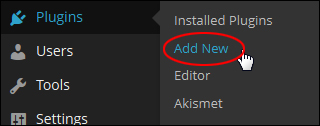
In the Install Plugins section, type in “cleverness” into the search field and click Enter on your keyboard …
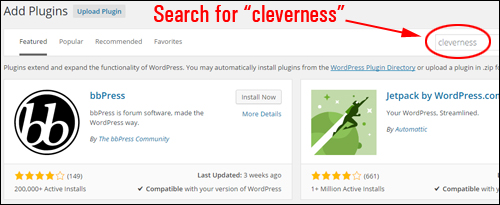
Locate the entry in the Search Results area and click Install Now …
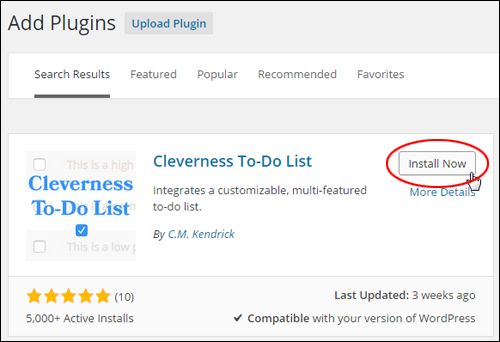
Click “Activate Plugin” …
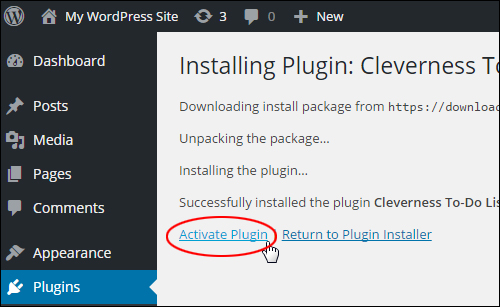
Note: You can also activate the plugin from the Plugins screen …

When you have activated the plugin, click on Settings …

Note: The plugin’s settings screen can also be accessed by selecting To-Do List > Settings from the dashboard menu …

This brings you to the ‘Settings’ area …

The section below shows you how to go through the plugin setup process …
Cleverness To-Do List Plugin Setup
The Settings area is divided into 4 tabs:
- To-Do List Settings – The options in this area let you specify the plugin’s main settings.
- Advanced Settings – The options in this area let you customize your To-Do lists, assign to-do items to other users and perform plugin database maintenance tasks.
- User Permissions – This tab lets you configure user permissions and capabilities for Master and Group List types.
- Import/Export – In this area you can export and import to-do plugin and list data settings.
Let’s now take you through each of these tabs.
To-Do List Settings
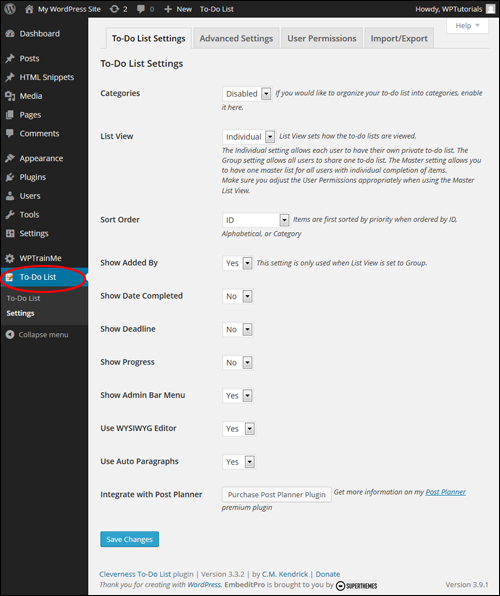
To-Do List Categories
Choose ‘Enabled’ to organize lists into categories, otherwise leave this option set to ‘Disabled’.
Note: When you enable this option, a ‘Categories’ item gets added to the To-Do List menu …
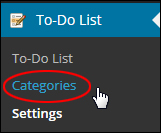
This lets you add categories to your lists (see ‘Plugin Usage’ section further below for more details) …
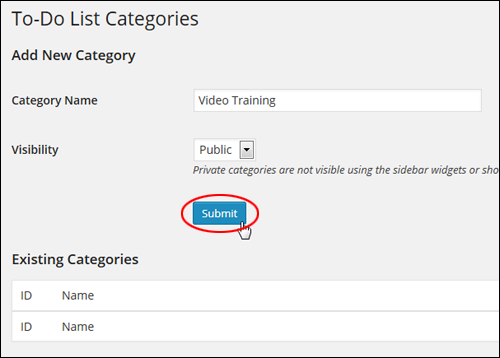
You can create ‘public’ and ‘private’ categories for your lists.
Categories marked ‘private’ are not visible using the sidebar widgets or shortcodes (only when ‘Sort Order’ is set to ‘Category’)
List View
List View allows you to choose how to-do lists are viewed. You can select three to do list views:
- Individual – Choose this option if you want each user to create and manage their own private to-do list.
- Group – Use this option if you want all users to be able to share one to-do list.
- Master – Choose this option to have a master list for all users, where users have their own individual completion of items. If you choose the ‘Master’ list view, make sure to adjust the User Permissions appropriately in the ‘User Permissions’ tab (this is covered further below).
Sort Order
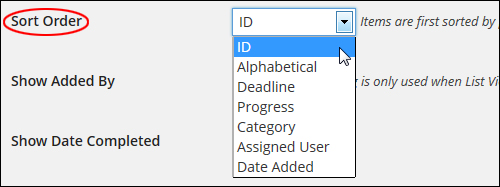
‘Sort Order’ lets you specify how your to-do list items will be sorted.
If you select Alphabetical, Category or ID options, items will be sorted first by priority.
Show Added By
If enabled (‘Yes’), you can display which users have added an item to your to-do list.
Note: This setting only works if ‘List View’ is set to ‘Group’.
Show Date Completed
If this option is enabled (‘Yes’), completion dates will display for your to-do tasks.
Show Deadline
Enabling this option (‘Yes’) lets you specify deadlines for your to-do items …
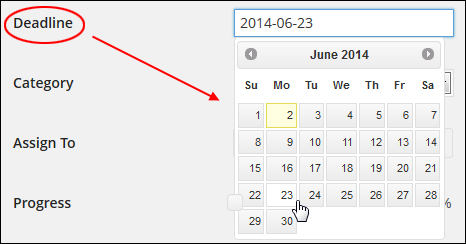
Show Progress
If this option is enabled (‘Yes’), you can specify task progress indicators for your to-do items …

Show Admin Bar Menu
If this option is enabled, the ‘To-Do List’ menu will display in your WP Dashboard Admin bar …

Use WYSIWYG Editor
This option lets you add and edit items on your to-do list using the WordPress WYSIWYG Editor …
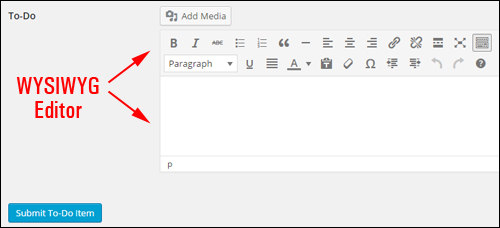
Use Auto Paragraphs
If enabled (‘Yes’), automatic paragraphs are used to display content in to-do lists.
Integrate with Post Planner
If you are running a multi-author website or blog, you can integrate the Cleverness To Do List plugin with a plugin called WordPress Post Planner, developed by the same author that provides you with a complete WordPress editorial solution …
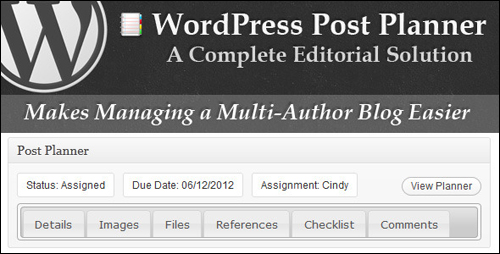
Go here to learn more about using this handy plugin: WordPress Post Planner – Editorial Solution Plugin For WordPress
After you have configured your plugin options, click the ‘Save Changes’ button to update your settings …

Advanced Settings
Once you have configured the general settings, click on the ‘Advanced Settings’ tab to proceed …

This brings you to the ‘Advanced Settings’ screen …
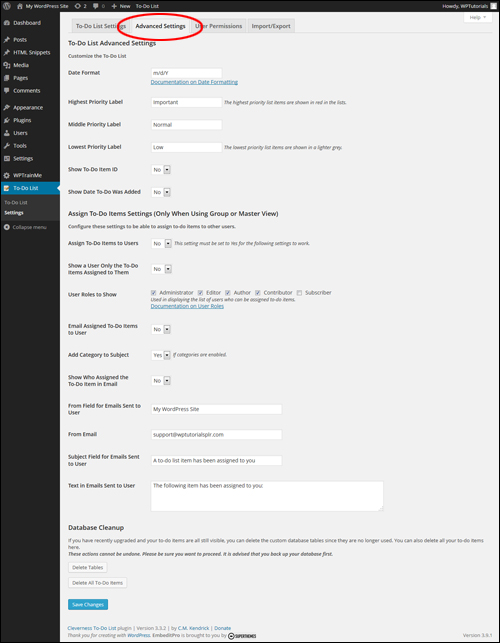
This tab lets you customize your To Do lists, assign to-do tasks to users and carry out database maintenance tasks.
Let’s step through how to configure the plugin’s ‘Advanced Settings’ section …
To-Do List Advanced Settings > Customize The To-Do List
This section of the ‘Advanced Settings’ screen lets you customize your To-Do List …
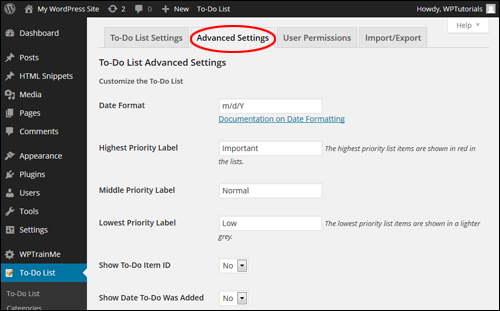
The following options can be configured in this section:
Date Format
Here you can specify how to display dates on your todo list (e.g. month/day/year, day/month/year, etc.)
Note: To learn more about formatting dates in WordPress, visit the date section of the WordPress Codex below:
WordPress Codex – Formatting Date And Time
Priority Labels
This section lets you customize your labels for prioritizing highest (important), middle (normal) and low items …

Highest (important) priority items are color-coded in red in your lists and lowest priority items display in a lighter shade of grey …
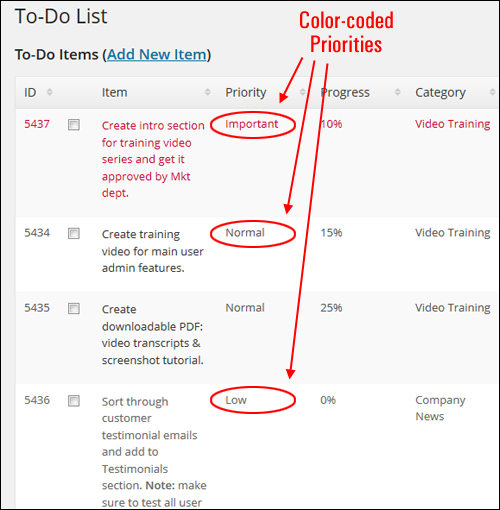
Show To-Do Item ID
Enabling this option (‘Yes’) shows the item’s ID on the list …
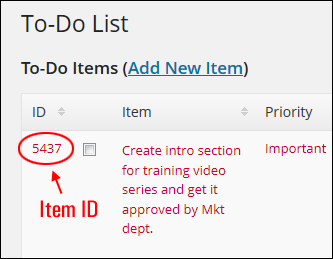
Show Date To-Do Was Added
If enabled, the date the to-do list was added will display on the items table …
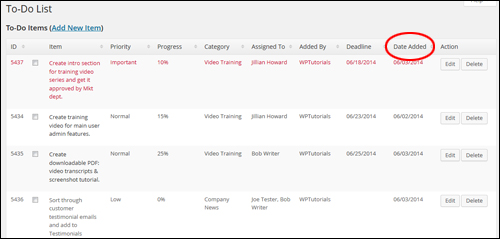
To-Do List Advanced Settings > Assign To-Do Items Settings
If you have selected either ‘Group’ or ‘Master’ View for your to-do list, you can configure the options in this section and assign items to other users …
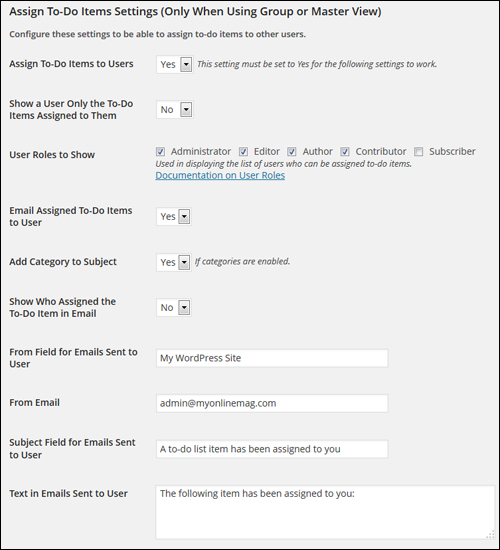
You can configure the following settings in this area:
Assign To-Do Items to Users
If this option is enabled, you can assign to-do items to other users …
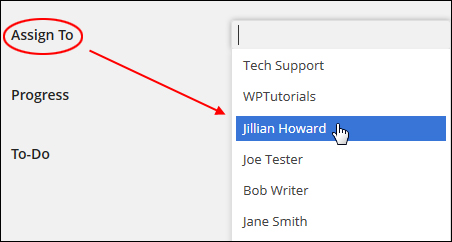
Note: This set this option to ‘Yes’ for the settings below it to work.
Show a User Only the To-Do Items Assigned to Them
If this option is enabled, you can display to-do items only to users who have been specifically assigned those items. Leaving this option disabled will display items to all users.
User Roles to Show
Checking the boxes in this area (Administrator displays the type of users that can be assigned items. Leave the checkbox unticked for any roles that you don’t want to assign to-do items.
Email Assigned To-Do Items to User
If you enable this option, WordPress will automatically send an email to users with their assigned to-do items …
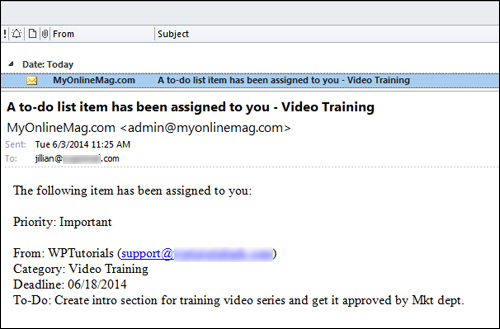
If you don’t want to send out emails to users, then leave this option disabled (‘No’).
Note: If you disable this option, you can skip the remaining items in this section.
Add Category to Subject
If you have enabled categories in your plugin settings and select ‘Yes’ for this option, the to-do category will display on the subject of your emails …
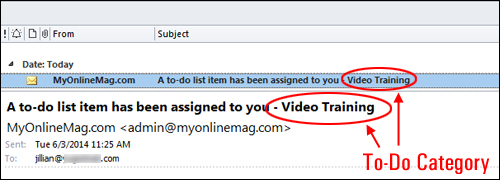
Leave this option disabled (‘No’) if you don’t want to display categories in the email subject.
If you don’t want categories to show the subject of your emails, then leave this option disabled (‘No’).
Show Who Assigned the To-Do Item in Email
If enabled, you can display the user who assigned the to-do item in the email. This is a useful option if you have several project managers assigning to-do items to users …

From Field for Emails Sent to User
Use this field to customize the “From” field when sending out email notifications. Enter your company name, your domain, your name, or anything you like into this field …

From Email
Type into this field the email address that you would like showing as the “sent from” email address …

Subject Field for Emails Sent to User
Type into this field a subject field for the email that will be sent out automatically to users when new items have been added in your to-do list …

Text in Emails Sent to User
Type into this field the body of the email message that will be sent out automatically to users when a new item has been assigned to your to-do list.

To-Do List Advanced Settings > Database Cleanup
This area lets you carry out database maintenance operations associated with plugin data directly from your plugin settings area itself without the need to access your web server …

This function is useful if, for example, you notice that previously deleted to-do items are still displaying on your site.
You can perform the tasks below in this section:
- Delete Tables – Remove custom database tables that you no longer use.
- Delete All To-Do Items – Delete all of your to-do items.
![]()
Any database operations carried out from this screen cannot be reversed. If you are sure that you want to perform database maintenance in this section, then make sure to backup your WP database first.
If you don’t want to back up your files yourself, then consider using professional assistance services, or use a backup plugin. You can read about a WordPress backup plugin that we recommend using to perform complete file and data backups here:
User Permissions
This section lets you configure user permissions and capabilities for Group and Master List types …

![]()
If you have chosen Individual List, the only configurable item that applies in this section is the View To-Do List option …
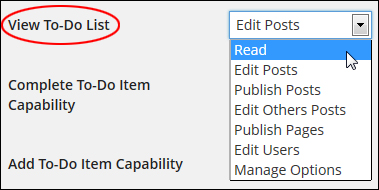
If you plan to set up user permissions and capabilities for Group and Master List types, select the highest level capabilities that you want users to have access to for each option …
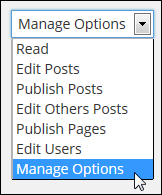
The default general capabilities for each user role are configured as follows:
- Subscribers: Read
- Contributors: Edit Posts
- Authors: Publish Posts
- Editors: Edit Others Posts
- Administrators: Manage Options
Note: When using the Master list type make sure that you only authorize non-administrators to view and complete items, otherwise they will be able to edit the Master list.
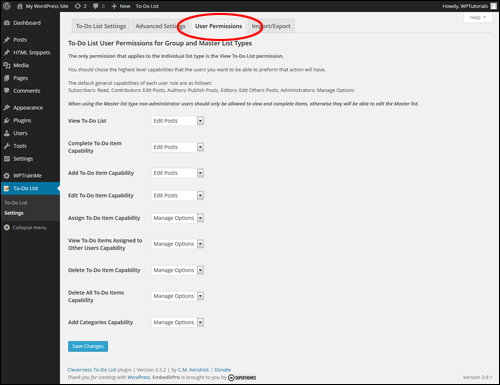
Let’s review the settings for the User Permissions tab:
View To-Do List
Here you can enable the chosen capability to view items in the dashboard widget and on the To-Do List page under the ‘Tools’ section.
Complete To-Do Item Capability
Here you can permit the chosen capability to mark to-do items as completed or uncompleted.
Add To-Do Item Capability
Here you can enable the chosen capability to add new to-do items.
Edit To-Do Item Capability
This setting allows the chosen capability to modify existing items.
Assign To-Do Item Capability
Here you can enable the selected capability to delegate to-do items to individual users.
View All Assigned Tasks Capability
This setting permits the selected capability to view all tasks even if “Show Each User Only Their Assigned Tasks” is set to ‘Yes’.
Delete To-Do Item Capability
Here you can allow the chosen capability to delete individual items.
Delete All To-Do Items Capability
This option allows the selected capability to purge all the completed items.
Add Categories Capability
This option allows the selected capability to add new categories.
Import/Export
Being able to import and export to-do list data can be useful. For example, you may decide to transfer data from one website to another, or export the list data for backup or archiving purposes.
To access this function, click on the ‘Import/Export’ tab in your plugin settings section …

Now you can import or export your to-do list data and plugin settings …
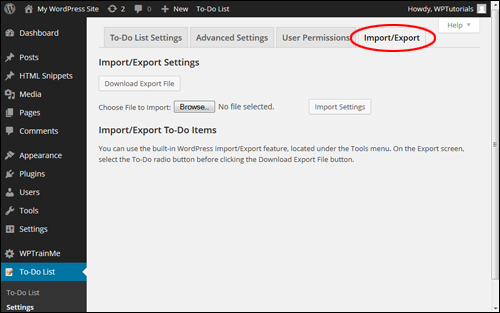
Exporting To-Do List Data
To export and download your data settings click on the ‘Download Export File’ …

This opens up a window allowing you to view or download your data in plain text format to a storage medium (e.g. your hard drive) …
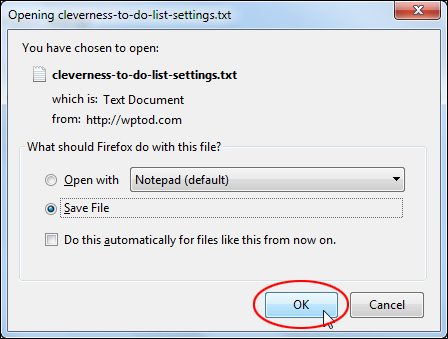
In addition to exporting to-do list data from the ‘Import/Export’ tab, you can also export data by going to your dashboard menu and choosing Tools > Export …
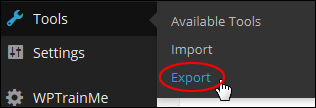
You can include to-do list data in a WordPress export file (in XML format), either by checking ‘All content’ (includes everything – posts, pages, etc…), or just select ‘To-Do’ from the ‘Choose what to export’ section and click the ‘Download Export File’ button to download your file to a storage device…
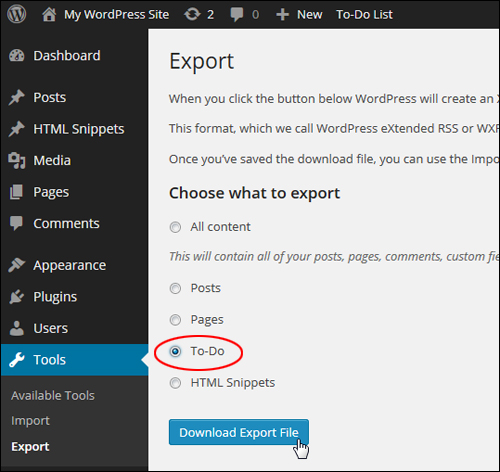
Importing To-Do List Data
To import a previously saved to-do list data file, click on the ‘Browse’ button next to the ‘Choose File to Import’ field …

Locate the previously saved to-do list data file in your hard drive or external drive and click ‘Open’ …
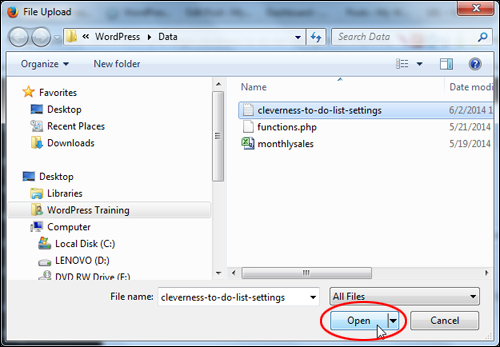
Once uploading the data file, click the ‘Import Settings’ button …

The data from the existing to-do file will be imported.
Now that you have configured all plugin settings, you can begin creating and editing your lists.
How To Use Cleverness To-Do List
To create a new to do list, log into your WordPress admin, then go to the menu and select To-Do List > To-Do List …
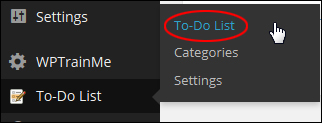
This brings up the ‘To-Do List’ screen …
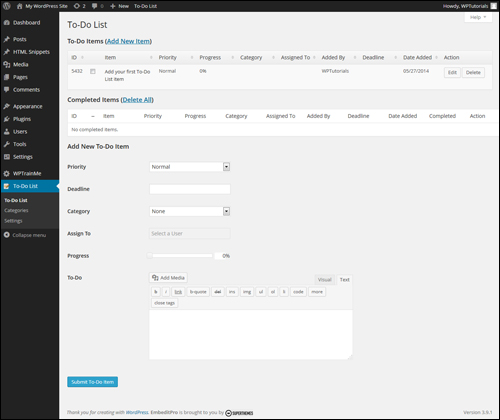
Add New To Do Items
There are a number of ways to add new items to your to-do list.
For example, you can add new to-do items to your list from your dashboard toolbar …

You can also add new items to your to-do list using the ‘To-Do List’ dashboard section by clicking on the ‘Add To-Do item’ link …
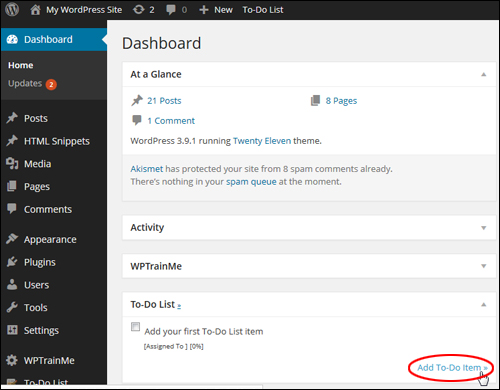
You can also click on the ‘Add New Item’ link in the ‘To-Do Items’ section (note: only use this option if your To Do list contains many items, as the link is only going to take you to the “Add New To-Do Item” section further down the page) …

The above methods will take you to the ‘Add New To-Do Item’ section.
Depending on how you have set up your plugin, you may or may not see certain options displayed when when you add new to-do items.
Select the options you have enabled for your to-do items, enter appropriate values and information into the relevant fields and click on the ‘Submit To-Do Item’ button to add the item to your list …
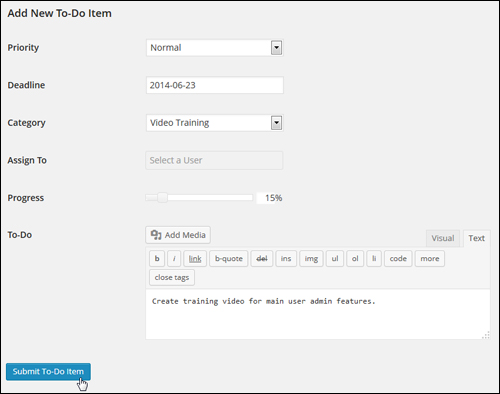
Note: If you are using a list type that allows you to assign responsibilities over items to specific users, select a user from the drop-down list and assign them the item …
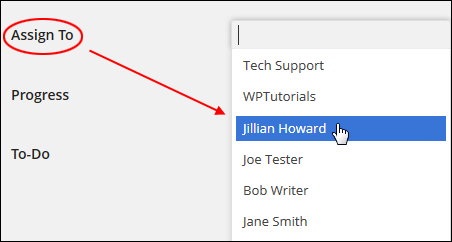
You can also make multiple users responsible for the same item (click on ‘x’ to remove users) …

After a new item has been added, it will be listed as an entry in the ‘To-Do List’ table …

Repeat this process to continue adding new items to your to-do list …
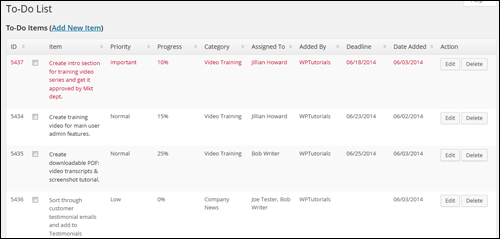
Editing And Deleting Items
To edit or delete an item, click on the ‘Edit’ or ‘Delete’ buttons associated with each item under the ‘Action’ column …

Depending on how you have set up the plugin (see previous section), users assigned to completing tasks may also receive an email notification in their inboxes …
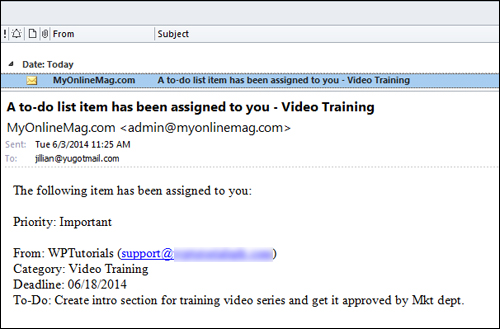
Once you have created your to do list, users can view the list from their own user dashboard …
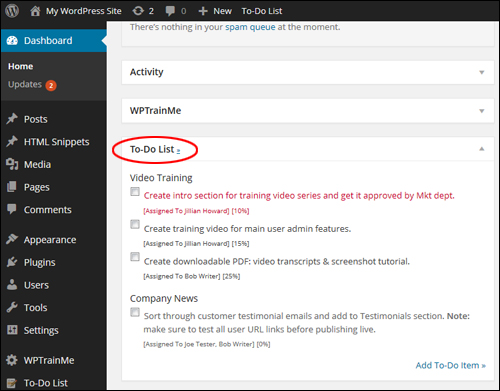
When users responsible for completing an item click on the item check box …
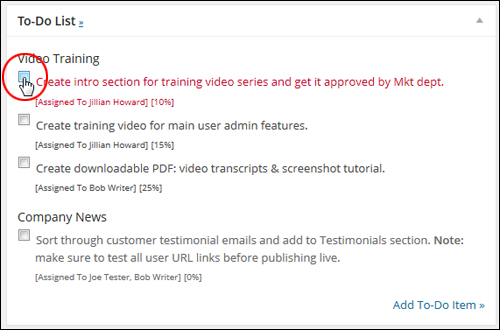
… the item is then deleted from the “To-Do” list …
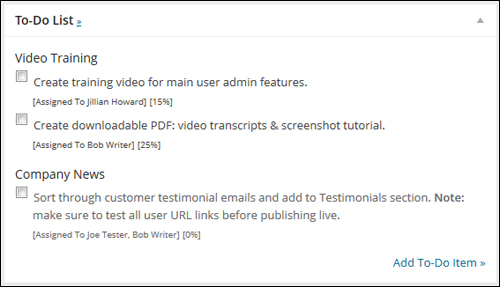
And gets added to the ‘Completed Items’ section located in the ’To-Do List’ plugin screen …

Additional Information
The Cleverness To-Do List plugin provides additional functions that let you display a to-do list on your website using widgets, and display lists on content inside a post or page using short codes.
Widgets
To add a to-do list to your site using widgets, go to the ‘Widgets’ page (Appearance > Widgets) and drag the ‘To-Do List’ widget to the menu location where you would like your list to display …

Configure the settings in the widget and click the ‘Save’ button …
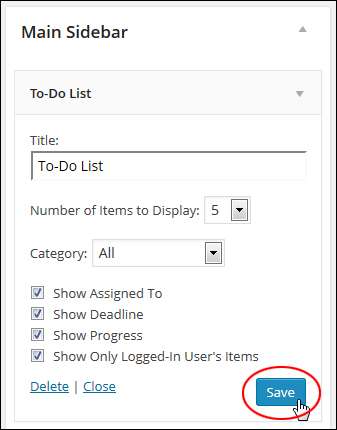
Your to-do list will display where the widget has been added (e.g. the sidebar menu, footer, etc.)
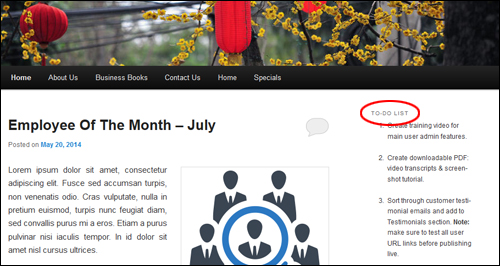
To learn more about using widgets in WordPress, see the tutorial below:
Plugin Shortcodes
You can also create lists on your site by placing short codes into your content.
To access the plugin’s shortcode documentation, click on To-Do List > To-Do List from the WP admin menu …
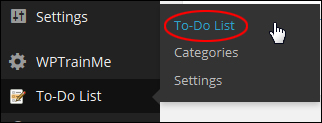
Click on the ‘Help’ tab on the top right hand corner of your screen …
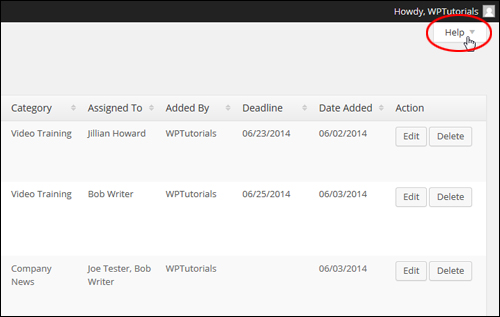
Click on the ‘Shortcodes’ tab to access the Shortcode Documentation …
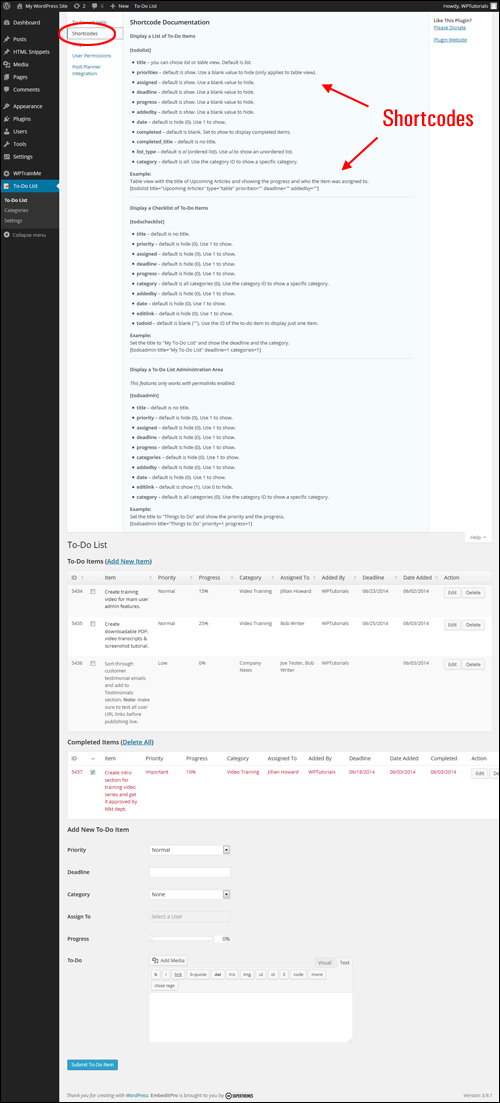
This documentation section explains various ways to configure and use shortcodes to display lists on your pages and posts.
Once you know what information you would like to display on your site, open up a new page or post and either type or paste the shortcode into the content section …
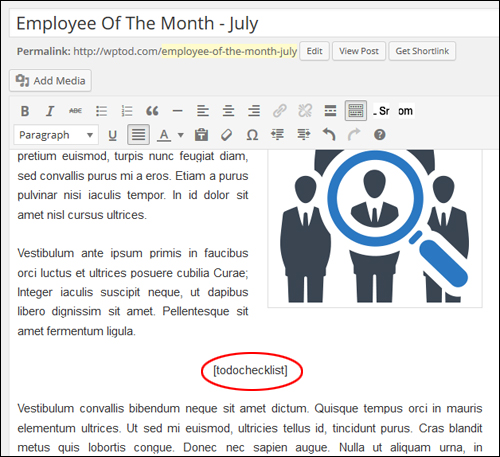
After publishing your post or page, you will see the list displayed where you entered the short code …
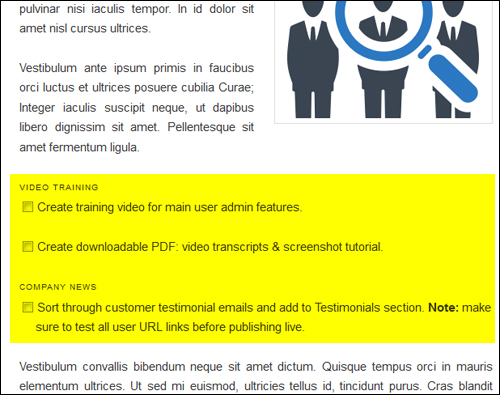
Visit the plugin website here to learn more about this plugin:
Congratulations! Now you know how to add to-do lists to your WordPress site or blog.
***
"Wow! I never knew there's so much to learn about WordPress! I bought one of the WordPress for Dummies three years ago, such authors need to be on this course!" - Rich Law, Create A Blog Now
***


